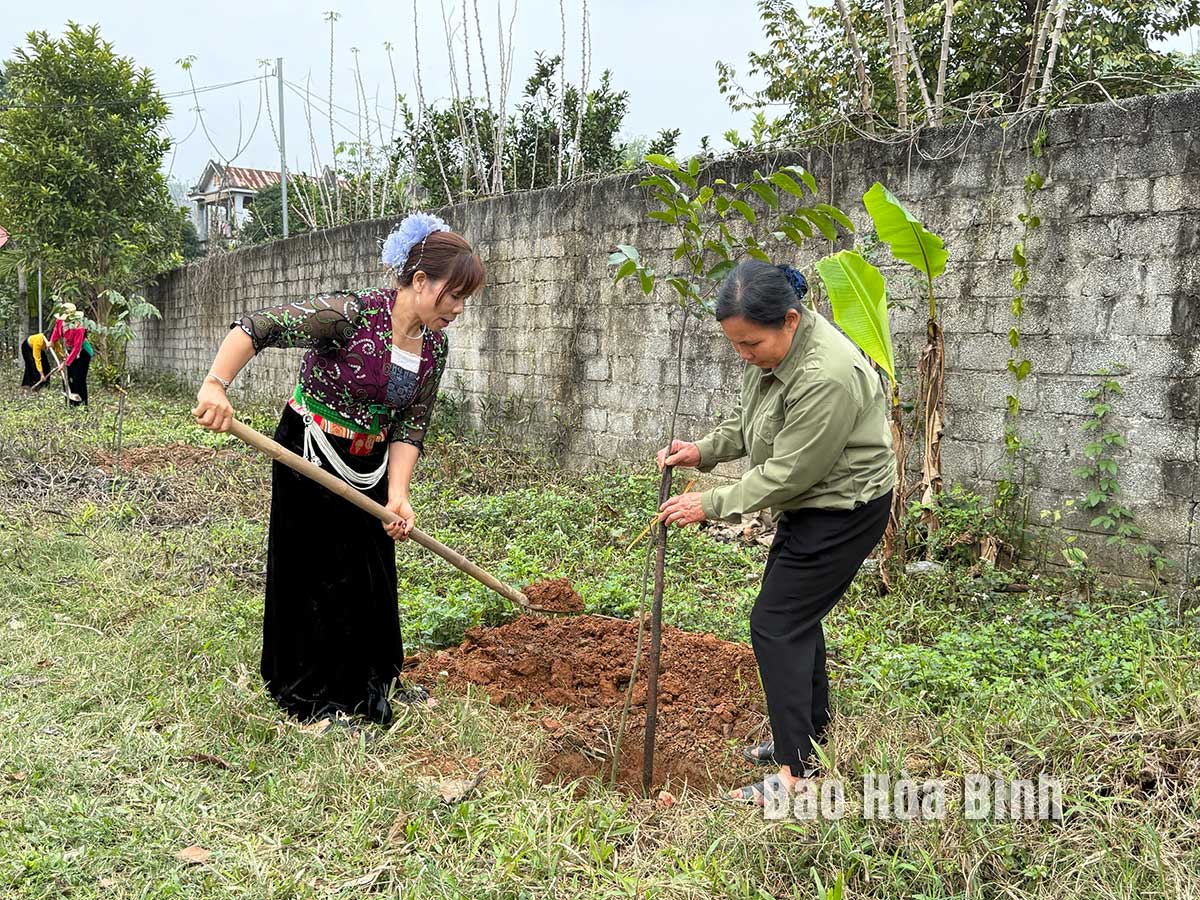
As climate change grows more unpredictable, the development of production forests has become essential - not just for economic growth, but for safeguarding the environment and maintaining ecosystem balance. By boosting local incomes, curbing natural disasters, preventing soil erosion, and protecting water resources, these forests play a crucial role in sustainable development.

Farmers in Man Duc town (Tan Lac district)
actively participate in the tree planting initiative
Following the issuance of Resolution No. 27-NQ/TU on
July 30, 2020, by the Hoa Binh provincial Party Committee, the provincial
Farmers’ Union (PFU) turned the document into action. The union instructed its
branches to implement the resolution through awareness campaigns and by integrating
its goals into work plans.
Since 2020, the PFU has used village loudspeakers,
community meetings, training sessions, newsletters, and its website to promote
forest management and development. Over five years, it held more than 19,500
awareness sessions and published 20 bulletins with 37,000 copies distributed to
local branches.
In support of the Prime Minister’s "One Billion
Trees” campaign, the union led the planting of 300 designated tree rows and
over 676,500 trees, helping combat soil erosion and restore barren hills.
Leveraging international funding from organisations
like ADDA, DDS (Denmark), LANDA, and the Forest and Farm Facility (FFF), the
PFU provided technical training on cultivating high-value trees and non-timber
forest products.
In five years, it organised 38 training courses for
1,140 farmers and established 31 large timber forest models and agroforestry
projects covering 54.8 hectares. It also supported 103 members with 105
hectares of large timber forests through interest-free loans totaling over 2.1
billion VND (82,000 USD) for 8–10 years.
Despite these efforts, challenges persist.
Investment programmes often lack synchronisation, and illegal logging and
charcoal production continue. Inconsistent policies and limited scientific
advancements in forestry hinder income growth and investment appeal.
Looking ahead to 2030, the PFU plans to address
these issues by intensifying education, promoting sustainable practices, and
enhancing biodiversity conservation while maximising the economic potential of
forest resources.
More than just an information technology teacher, Bui Van Nien is an inspiring figure who has nurtured the scientific curiosity and creative spirit of students in Vietnam’s ethnic minority communities.
Da Bac is the most disadvantaged mountainous district in Hoa Binh province, with ethnic minorities accounting for about 90% of its population. Over the past years, the district has mobilised resources to implement ethnic policies to improve the quality of life of local people.
In recent years, Hoa Binh province has consistently prioritised the protection, care, and education of children, particularly those from ethnic minorities and disadvantaged backgrounds, by creating a safe, healthy, and nurturing environment for their all-round development.
The Steering Committee for Tobacco Harm Prevention and Control of Hoa Binh province, in coordination with the Tobacco Harm Prevention and Control Fund, held a ceremony on May 28 in response to the World No Tobacco Day (May 31) and the National No Tobacco Week (from May 25 to 31). The event was chaired by Nguyen Van Toan, Standing Vice Chairman of the provincial People’s Committee and head of the Steering Committee.
Since 2021, the Center for Industrial Promotion and Industrial Development Consulting (CIIDC) under the Department of Industry and Trade has been implementing a school lighting model as part of the plan for using energy efficiently and economically in Hoa Binh Province in the pẻiod of 2021 - 2025. This model not only aims to improve the learning conditions and enhance the education quality, but it also promotes the message of energy saving, energy security, environmental protection and contributes to the goals of socio-economic development.
In the 2024 - 2025 school year, the entire Hoa Binh provincial education sector includes 520 educational institutions and schools. Among them are 13 ethnic boarding schools with 153 classes and 4,487 students. Four of these schools have met national standards, reaching 30.7 percent.



